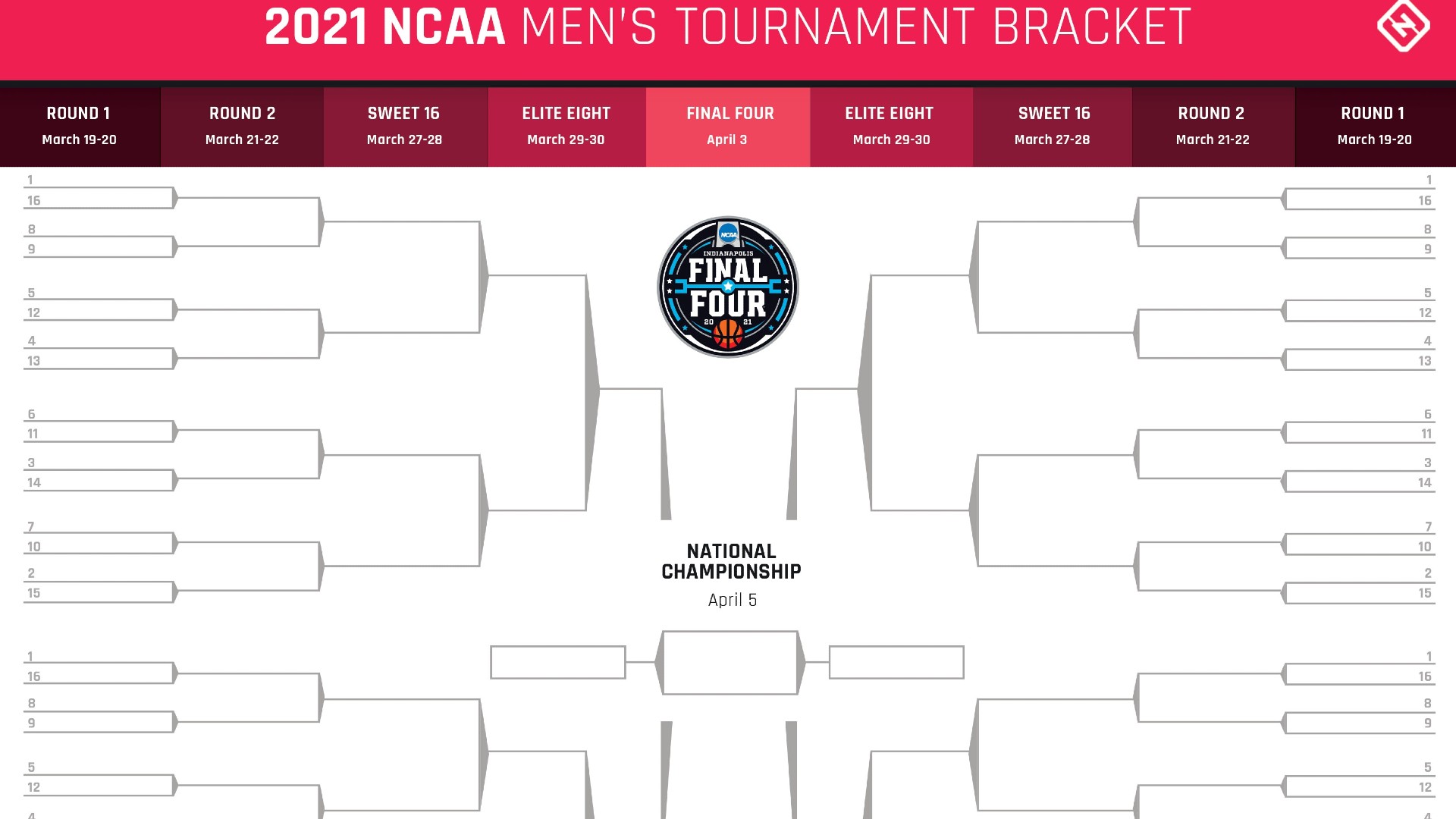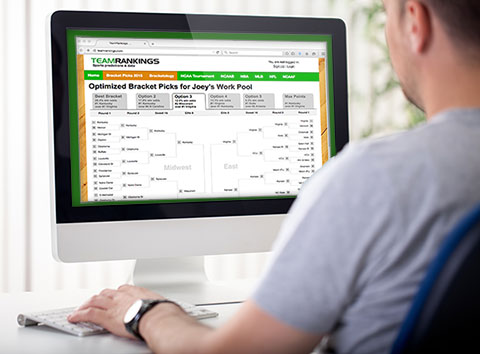
During March Madness, one thing is certain. You are going to hear very poor strategy advice and tips for making NCAA tournament bracket pics. Some of it will also come from the most respected names in the college basketball world.
Sometimes it can be difficult to separate signals from noise because of bracket strategy. Nevertheless, it pays to know the difference. A lot of conventional wisdom about bracket picking is just plain wrong, and after that your March Madness will reduce your chances of winning the pool.
After analyzing public picking trends in past NCAA tournaments and running millions of computer simulations of bracket pools, we know what the data say about winning bracket pool strategy. There are four things you need to do to give yourself an edge in the March Madness bracket competition this year.
Editor’s Note: This is a guest post from TeamRankings.com, which has since 2004 recommended taking the expert bracket. Since 2017, his clients have reported more than $ 1.7 million in bracket pool award wins. Ncaa bracket pics.
Attract Expert Attention: Teamranking ncaa bracket pics
NCAA Tournament Bracket Advice: Best Strategy Tips for Winning the March Madness Pool
Consider how your opponents can choose
In bracket pools, there are no prizes for getting a certain number of pix correct. You are competing against other people, and the only way to win is to end up with a higher score than all your opponents. You can only get a high score if you get a pick right that your opponents get wrong. (Of course, it helps the most if that pick is worth a lot of points.)
This dynamic has large implications for bracket picking strategy because it means that the picks chosen by your opponent have a major impact on your odds to win your pool. If you just pick the teams that everyone else is picking, then you won’t have a great chance to win. As a result, you should never fill your bracket without factoring in your best guesses as to what your opponents are likely to do.
For example, if you are in an NCAA bracket pool full of Michigan graduates, then you should assume that Michigan would be a very popular pick in your pool and think how you could make a smart bracket that would make Michigan an important pick. Does not present in the form. .
Thinking more broadly, you should also consult the national bracket picking trends data published by major bracket competition sites such as ESPN and Yahoo to gain a general understanding of the teams on which the public is heavily focused. (To get a balanced picture, we Consolidate bracket picking trend data from multiple sites.)
Ideally, you want to identify teams that have a solid chance of winning the tournament – or at least make a deep run – that are underestimated by the public. To do this, you will need a purposeful and reliable source of tournament forecasts, such as tournament forecasts and our algorithmic estimates, which you can publicly compare to the trends you choose.
For example, if a team has an 18 percent chance of winning the tournament, but only 10 percent of the public is doing so, then you have found yourself an unpopular team that deserves your consideration.
Nevertheless, this argument has its limitations. Should you avoid choosing every overrated team? No, very popular picks are usually popular for a good reason – because they are strong teams. And a lot of strong teams in your bracket lose quickly, usually too risky for a strategy. However, in many pools, making an educated gamble on one or two (yet solid) teams, most people think they can help your cause.
Attract Expert Attention: Teamranking ncaa bracket pics
Do not choose too many upsets in your bracket
Picking too many upsets is poison that ruins many brackets. We know, it’s March Madness, and we all remember previous Cinderella stories. Everyone dreams of picking the next Loyola-Chicago, who gained the country’s attention as the No. 11 seed in 2018 by scoring an improbable run in the Final Four.
However, handsite is 20/20. Given that a Longshot team (say, No. 5 seed or worse) makes the Final Four one thing often; Correctly predicting a specific Longshot team to make the Final Four in any given year is a completely different animal. Your chances of doing this are not good, and the stakes are high. If a relatively popular pick makes the Final Four instead of your Longshot pick, you’re going to give a lot of points to a lot of your opponents.
In fact, the biggest reason that our algorithmic brackets consistently outperform publicly is because many bracket pool players become too risky with their picks in the first round. Most bracket pool scoring systems have many more points when the subsequent round picks are correct, with the highly seeded team losing early enough to lower your expected score.
Don’t take our word for it though. Back in 2009, Journal of Applied Social Psychology Published a study About NCAA tournament predictions. Professors studying pix from the public received a similar conclusion – in particular, that choosing a highly-seeded team in every matchup would yield a national average bracket score on ESPN.
Thankfully, there are more effective pick strategies than choosing a higher seeded team, but you get the point. There is plenty of evidence to deny the narrative’s refutation, which requires you to select a bunch of upsets and correct them to do well in your NCAA pool.
With that, there are some exceptions, such as if your pool gives bonus points to correct a troubled pick. Which leads us to the next piece of advice…
Attract Expert Attention: Teamranking ncaa bracket pics
Adjust your pickup strategy to the size of your pool
The advice not to bother too much applies to most bracket pools. This is a particularly wise strategy for pools that use the most common scoring format (1-2-4-8-16-32 points per correct pick, by round) and do not make 100 or more entries.
However, if you are in a very large NCAA pool, or someone who uses a pick-up bonus, such as an upset pick bonus, a change in the probability of optimal pick strategy. In terms of pool size, the larger your pool, the more risk you usually have to make with your choice to maximize your chances of winning. Let’s examine why.
In a small pool (say 20 entries or less), there may be some other brackets for you with the same championship pick. As a result, if you take your championship pick right and follow a smart (ie, more conservative) pick strategy early on, you’ll have a great shot at winning the pool. Chances are slim that one of your opponents will pick the champion right And You perform better in the earlier rounds.
However, when you are competing with 500 or 1,000 or 10,000 people, this is no longer the case. In larger pools, chances are high that one or a few entries will nail both NCAA champion picks And Some crazy upset in the first round (like for a 7-seed Final Four because it was his alma mater), just by dumb luck. In the worst case, if a popular champion wins the tournament, it becomes extremely difficult to outsource every one of the hundreds of entries to a large pool.
As a result, increasing your odds to win a larger pool often requires taking some significant risks, such as a very unpopular 4-seed pick to win the entire tournament. The chances of this happening are also less, but on balance, our Data-driven bracket research It has shown that this is often a smarter bet than choosing the more popular champion. If your unpopular pick wins, even in a large pool, there will be only a few others in a position to win the pool with you.
Attract Expert Attention: Teamranking ncaa bracket pics
Adjust your pick strategy for your pool’s scoring system
The most common bracket pool scoring system awards 1-2-4-8-16-32 points per round. However, many variations exist, and non-standard scoring systems may call for very different pick tactics.
For example, if you are in a pool that scores points based on the seed number difference between the winning and losing teams, then you are a 12-seed pick to get 5-seeded in the first round compared to scoring Will receive eight points for Only one point to take a 5-seed to win. As it turns out, most 12-seeds have won a very large margin of 12.5 percent (one divided by eight) and therefore this scoring system has good values to take from a perspective derived from expected scores.
We also see some pools where scoring is based on multiplication of seed number. In a pool like this, correctly picking 10 seeds to make the Sweet 16 gives you 30 points, while correctly picking a 1-seed to win the national title gives you only 21 points in comparison. In that system, choosing too many double-digit seeds to make the Sweet 16 is a very smart risk. Even if only a couple of them finished it, you would still earn a ton of points.
Therefore it is very important to take time to understand the implications of your pool rules. While most players have very high fluctuations in the standard bracket pool scoring system, they often do not have substantial fluctuations in the upset-bonus system. From year to year, we see that the optimal brackets for the standard bracket system are considered too conservative by the public, while the optimal brackets for the perturbed bonus systems are extracted to look a lot more insane.
Winning the NCAA bracket pool is not easy, but with these four strategy tips in mind, you will avoid some of the common pitfalls that uninformed bracket pickers fall prey to. As we like to say, the smarter your strategy is, the less luck you need to win.
Lastly, if you are interested in crafting all this strategy and crunching numbers to the pros and are just getting brackets, which gives you the best chance to win your pool, then be sure to check us out 2021 NCAA Bracket Pix Products.
In 2019, 71 percent of TeamRankings customers reported winning awards in their NCAA bracket pool.

Leave a Reply